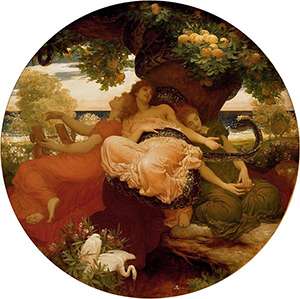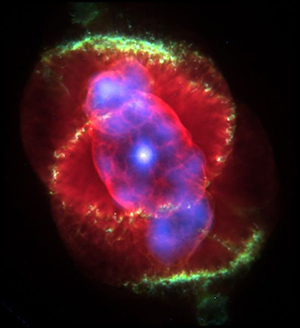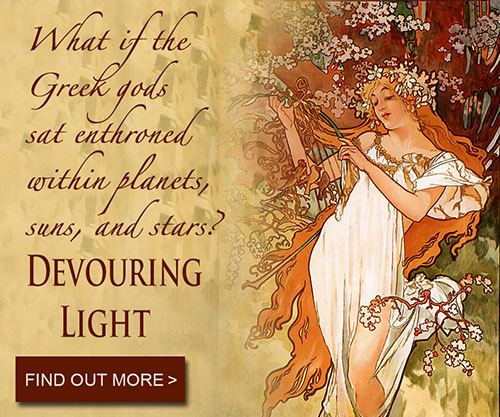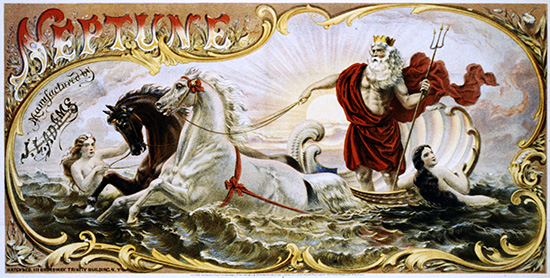Several constellations receive mention in my novella, Devouring Light. Cygnus the Swan soars across the eighth sphere. The Great Bear lumbers along its vast curve. And, embracing the freedom of fiction, I created a few constellations unknown to Earth’s history: the Simiae and the Winged Bulls.
But one constellation alone features prominently in my story: Draco.

Older by far than the planetary spirits, Draco is a wily, jaded creature who’s forgotten the pleasures of living in his neck of the universe. His capricious response to his boredom pushes first Mercurio, and then Haden, toward action that summons catastrophe.
Of course, many an ancient legend about the dragon preceded my own Devouring Light.
According to the ancient Greeks, a dragon named Ladon guarded the garden of Hera, queen of the gods. Within Hera’s garden grew a grove of trees with golden apples that bestowed immortality upon their eater. Nymphs – the Hesperides – tended the garden and occasionally stole the apples. Ladon was given the task of preventing such theft, whether by the nymphs or by other intruders.
 Despite Ladon’s watchful ferocity, two renowned trespassers managed to steal apples. Eris, the goddess of discord, inscribed her stolen fruit with the phrase “to the most beautiful.” When she rolled the apple into a wedding (from which she had been excluded), she started the Trojan Wars.
Despite Ladon’s watchful ferocity, two renowned trespassers managed to steal apples. Eris, the goddess of discord, inscribed her stolen fruit with the phrase “to the most beautiful.” When she rolled the apple into a wedding (from which she had been excluded), she started the Trojan Wars.
Hercules was the other interloper. Of the twelve labors given him, the eleventh was the theft from Hera’s grove. He didn’t attempt the feat himself. Instead he offered Atlas a break from holding up the world, if Atlas were to do the deed. Atlas possessed the advantage of being the father of the Hesperides, and he liked the idea of a rest for his shoulders. In fact, he liked it so much that he refused to exchange the stolen apples for the world. He didn’t want it back.
Hercules agreed to take Atlas’ place permanently, so long as he could first rearrange his cloak. Naturally, once Atlas again bore the world on his own shoulders, Hercules did not keep his promise. Not much honor amongst those Greek gods and heroes!
In one version of the myth, Ladon is rewarded for his long vigil by being enthroned in the sky as a constellation. Certainly, the two constellations – Draco and Hercules – are near one another in the heavens.
The ancient Romans told a different tale about the dragon. Draco was one of the Titans, monsters who fought the Olympian gods for dominion over the earth. The war was grievous and long. In the final battle, when the Olympians prevailed, the goddess Minerva confronted Draco. She won and tossed the defeated dragon into the sky. Frozen by the cold northern Celestial Pole, he stayed there for eternity.
In addition to its mythological importance, Draco also possesses elements of interest to astronomy.
The star Thuban – head of the serpent – shines within Draco. It’s a blue-white giant and occupied the position of pole star from 3942 BC to 1793 BC. The ancient Egyptians noted this and built their pyramids with one side facing north and an entrance there that permitted Thuban to be seen within. Because the Earth wobbles on its axis – a cycle that takes 26,000 years – Thuban will become the pole star again in 21,000 AD.
 The Cat’s Eye Nebula is located in Draco. It possesses one of the most complex shapes ever seen through the Hubble Space Telescope. Created 1,000 years ago by an exploding star, the nebula features knots, jets, bubbles, and arc-like structures.
The Cat’s Eye Nebula is located in Draco. It possesses one of the most complex shapes ever seen through the Hubble Space Telescope. Created 1,000 years ago by an exploding star, the nebula features knots, jets, bubbles, and arc-like structures.
The quasar Q1634+706 also inhabits Draco. 12.9 billion light years away, it’s so bright that it’s the most distant object that can yet be seen through an amateur telescope.
And, finally, Draco hosts the meteor shower known as the February Eta Draconids.
On the cultural side of things, I am not the only artist inspired by Draco.
The film Dragonheart presents the constellation as a heaven to which the spirit of any dragon ascends after death, if it has upheld an ancient dragonish oath to guard mankind. The Russian chess master master Fyodo Dus-Chotimirsky named the chess opening of the Sicilian Defense the Dragon Variation, after the constellation. And J.K. Rowling named her antagonist, Draco Malfoy, in the Harry Potter series after the starry Draco.
For more about the world of Devouring Light, see:
The Celestial Spheres of Sol
What Do Celestials Wear?
The Graces
Roman Dining
The Heliosphere
The Oort Cloud
Mercury the Planet
The Simiae





